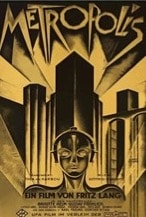This Week in History recalls memorable and decisive events and personalities of the past.
10th January 1927 – Fritz Lang’s futuristic film Metropolis is released in Germany.
The film Metropolis remains to this day one of the most influential films in the science-fiction genre, particularly in film and video games.

The screen play was written by German writer Thea von Harbou and her husband, the film’s director, Fritz Lang. The screen play was based on of a novel Harbou had written specifically as the basis for making it into a film, drawing inspiration from early science fiction writer and socialist H.G. Wells and author of Frankenstein, Mary Shelly.

Production began in 1925 with an original budget of 1.5 million Reichsmark, which would balloon to 5.3 million. The shooting took 17 months with 310 days of filming and 60 nights of filming. The film was a pioneer in special effects and art design with its use of miniatures and well-crafted sets still remaining impressive to this day.
The film was set in a massive futuristic city in which the upper classes live in luxury in the upper reaches, whilst the city’s underbelly is powered by masses of working class minions who toil away in drudgery to keep the city running.

The plot focuses on an attempt by one man to unite the classes with the help of an angelic woman from the lower reaches, whilst a villain attempts to cause chaos with the help of a robotic woman who is a likeness of the angelic character.
The plot and themes are typical of an idealistic moderate socialist outlook common to the early 20th century, especially in the art circles of Weimar Germany.
It received a mixed reception from critics upon its release, with almost everyone praising the incredible special effects, but many pointed to the plot as a weakness.
In its original release in 1927 in Germany the film was 153 minutes long. This was soon edited down to 116 minutes and then 105–107 minutes when released in America later in 1927. Since then it has had at least 6 different cuts with one of the most recent being a 148-minute version in 2010.
Future Nazi minister of propaganda Joseph Goebbels was a huge fan of the film and its message of social justice, and claimed in a discussion with the director, Lang, that the film had been enjoyed by Hitler who wanted Lang to cooperate with the Nazis in making German films.
As the decades passed, the film’s popularity has only grown, and its imagery has become the standard for almost all modern depictions of a futuristic city, influences of which can been clearly seen in more modern films like Blade Runner or Star Wars: The Phantom Menace.
The famous film critic Roger Ebert said in 1985 that, ‘Metropolis is one of the great achievements of the silent era, a work so audacious in its vision and so angry in its message that it is, if anything, more powerful today than when it was made’.
The film originally passed into the public domain in the United States in 1953, but new legislation in 1996 placed it back under copyright. However, as of 1 January of 2023 the film returned to the public domain in the United States.
In the European Union the film remains under copyright until 2046.

